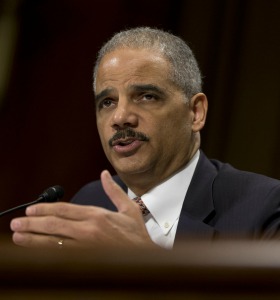 Eric Holder (AP Photo/Evan Vucci)
Eric Holder (AP Photo/Evan Vucci)
WASHINGTON — On the 45th anniversary of Martin Luther King’s death, Attorney General Eric Holder challenged the Supreme Court to uphold a key section of the Voting Rights Act that requires all or part of 15 states with a history of discrimination to get federal clearance before carrying out changes in elections.
Holder made the comments Thursday in a speech to a civil rights group whose founder and president is the Rev. Al Sharpton. Focusing on issues he regards as important during President Barack Obama’s second term in office, Holder vowed to protect the voting rights of all Americans, safeguard young people from gun violence and improve the criminal justice system.
Opponents of the Voting Rights Act of 1965 say the pre-clearance requirement has outlived its usefulness. Starting in 2009, the Supreme Court made clear its skepticism about the present-day need for the provision. The court is considering a challenge on the issue from Shelby County, Ala., near Birmingham.
Since 2010, at least 10 lawsuits have been filed arguing that the pre-clearance requirement is no longer constitutional, said Holder.
“Let me be clear: While this country has indeed changed, and real progress has been made, we are not yet at the point where the most vital part of the Voting Rights Act can be described as unnecessary or a product of a flawed political process,” the attorney general told the National Action Network.
“As we await the court’s decision, I want to assure you that — no matter the outcome — the Department of Justice will remain committed to the aggressive and appropriate enforcement of all voting and civil rights protections, including every part of the Voting Rights Act,” Holder said.
Voting rights have long been a centerpiece of Holder’s law enforcement agenda. In a speech just over a year ago at the Johnson Presidential Library, Holder declared that the nation needs elections that are more, not less, accessible to the voters.
The Justice Department went on to challenge some newly enacted state laws requiring voters to present photo IDs at polling places on Election Day. Republicans said photo IDs were needed because of widespread voter fraud at the polls, a problem that Democrats said was non-existent. In an appearance before the NAACP in Houston, the attorney general likened the voter ID law in Texas to a poll tax, the fees once imposed across much of the South that made it impossible for many African Americans to vote.
As the nation’s chief law enforcement officer, Holder has for months joined the president in calling for an array of gun control measures in the wake of the shootings that killed 20 first-graders and six adults at Sandy Hook Elementary School in Connecticut. The proposals include universal background checks, a ban on high-capacity magazines and an assault weapons ban. Those measures are in trouble on Capitol Hill.
On Thursday, Holder said the package of gun control proposals “is consistent with the Second Amendment and would not infringe — in any way — on the rights of responsible, law-abiding gun owners.”
“Many have said that these will be tough votes, and I understand that the gun lobby will attack some who support reform. But progress is never easy,” Holder said.
On Wednesday, President Barack Obama stepped up his call for background checks for all gun purchases and renewed his demand that Congress at least vote on banning assault weapons and limiting access to large-capacity ammunition magazines. Key senators have been unable to reach a bipartisan compromise that would require federal background checks for gun transactions between private individuals. Federal background checks currently apply only to sales handled by licensed gun dealers.
On improving the criminal justice system, Holder said the government is providing increased support for programs offering quality legal representation to people who cannot afford it. He said the Obama administration is focused on more effective policing at the state and local levels, using intelligence-based strategies to target law enforcement resources to areas where they’re most needed and seeking new ways to help crime victims — especially victims of sexual assault — to make their lives whole again.